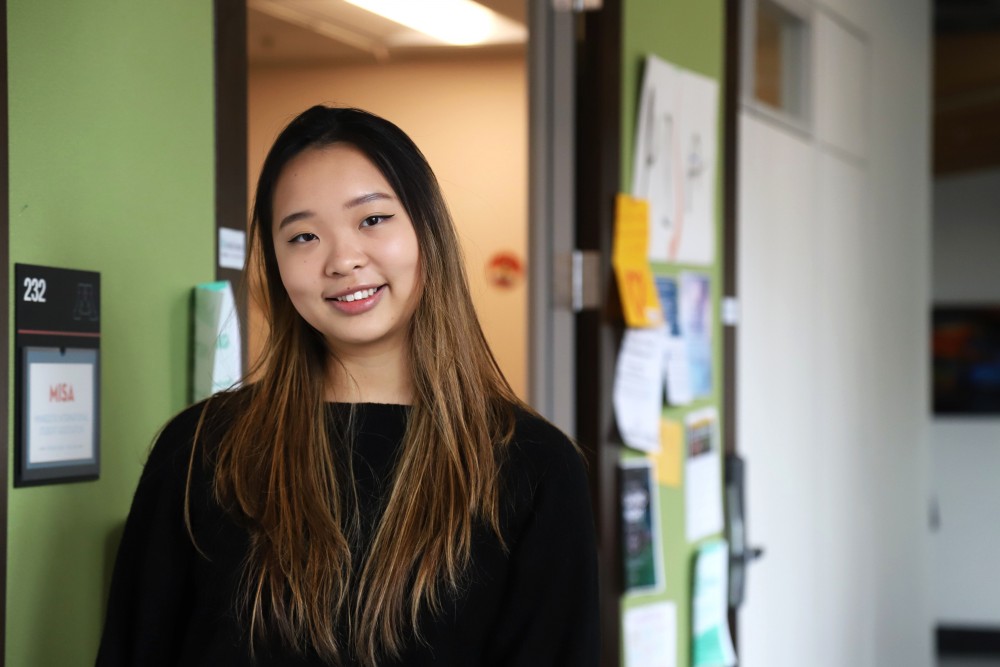Due to the complicated process of obtaining work visas and the nation’s political climate, some international students say securing jobs is becoming increasingly difficult.
The University of Minnesota has seen a consistent, high demand for career services tailored to the needs of international students. To combat difficulties international students face, student groups are stepping up to educate students and the broader community.
“It’s a very complicated process … you go through one step and there’s another obstacle that comes up,” said Sophronia Cheung, a sophomore from Hong Kong studying economics and political science.
Cheung serves as a facilitator for the International Student Advisory Board, which is currently working on a career initiative for international students, she said. She said they want to create a web series, presentation and guidebook for international students before the career fair.
“The problem we find in terms of international student careers is that they don’t really know the types of visas, regulations [and] the logistics and legal stuff that they have to go through,” Cheung said.
The group also plans on reaching out to employers who attend the career fairs to provide additional education on the benefits of hiring international students.
While attending school and after graduation, international students are eligible for Optional Practical Training, a temporary employment program directly related to a student’s major area of study. After the 12 months of OPT has been used by an individual, there is a cost to employers, said Jane Sitter, an International Career Consultant at the University.
Sitter, who is part of the Office of Student Affairs, is the second person to hold the role of International Career Consultant. The position was created in 2015 after the University realized international students could benefit from individualized support.
In addition to assisting international students, Sitter counsels local employers on how they can employ international students and University faculty on how they can better support these students.
Sitter said costs associated with sponsoring international students along with a lack of policy understanding contributes to employers’ hesitancy in hiring international students. The University combats this by assisting employers in filling out paperwork and providing guidance on legal regulations.
“That’s a lot of times the missing piece, is that employers don’t understand the process,” she said.
After international students have used their OPT, they must apply for working visas, which international student Stanley Chow described as “notoriously hard to get.”
Chow said the visa lottery system prioritizes people in STEM fields. “For us, it’s very apparent that the government is only looking for STEM students in particular. And for students like me, who are not in the STEM field, I feel a little bit left behind and overlooked,” he said.
The complex legal process for obtaining visas is further complicated by the lottery system, Cheung said.
“I have heard from a lot of people, my friends, who are not getting hired because of the political climate right now. And also because the lottery system is harder,” she said. “So even if they are employed by their employers, they might not get the lottery. And no matter their experiences, they might just get deported back to their home country.”
And returning to their home country is not always the best option for an international student, Cheung said, as an education from an American university is valued differently in each country.
“A lot of my friends have talked about just giving up and moving back to their home countries or moving to Canada or Europe because they see it as more unwelcoming to stay here,” Cheung said.
In addition to going through the complicated process of securing a visa, students must navigate a changing political climate. While Chow said the University community and state have been welcoming, the election of U.S. President Donald Trump signaled a change in the values of the country.
“[Trump] would be a great symbol of such change in the philosophy of the U.S. as a nation because we used to consider the U.S. an immigrant state where people come from … all over the world,” he said. “But since [Trump] was elected, that means there is a significant amount of people who deviate from that belief and at the very least it kind of worries me.”
When deciding where to attend college, Cheung said she was drawn to the University’s academics, financial aid and welcoming atmosphere. While her post-graduation career prospects weren’t a deciding factor, she said they remained on the back of her mind.
“It was definitely something I thought of. Originally, I wanted to study in the states because it’s easier to get a job,” she said. “But now that I see it, actually living here and hearing stories from people, it might not be the case.”








